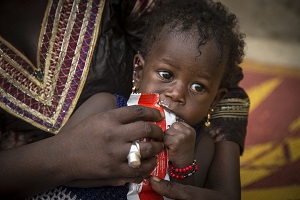Mali: Nutrition crisis deepening in conflict-affected areas, says UNICEF
A nutrition crisis, exacerbated by continuing violence, instability and displacement in Mali, is threatening the lives and futures of thousands of children in the West African country, UNICEF warned on Oct 09.

At the Bellafarendi Health Center, Azaharatou Dicko gives UNICEF-supplied ready-to-use therapeutic food to her daughter, Farimata Dicko, 13 months, who suffers from severe acute malnutrition.
New data published on Oct 09 from the 2017 SMART (Standardized Monitoring and Assessment of Relief and Transitions) survey shows that the rate of acute malnutrition among children under five has reached critical levels in the conflict-affected areas of Timbuktu and Gao, while the national rate remains very high.
The survey shows acute malnutrition of children in Timbuktu has risen to 15.7 per cent and in Gao to 15.2 per cent, a worrying rise from “serious” to “critical” level on the World Health Organisation’s classification scale. Serious levels of acute malnutrition were also recorded in the regions of Kayes (14.2%) and Taoudéni (14.3%), while the national rate is 10.7%.
“Behind these figures are the lives of the most vulnerable and forgotten girls and boys in Mali,” said UNICEF Representative Lucia Elmi. “We must provide life-saving treatment and ensure each and every one of these children can fully recover. At the same time, we need to invest in the critical first 1000 days of the lives of children to reduce the risk of acute malnutrition from occurring in the first place.”
An estimated 165,000 children are expected to suffer from severe acute malnutrition across the country in 2018. Children who suffer from the severe form of acute malnutrition have grave muscle wasting, very low weight for their height, and are nine times more likely to die in case of disease due to a weakened immune system.
Since the 2012 political and security crisis in Mali, violence and instability have led to displacements of population and disruption of social services in the north of the country, with detrimental impact on the nutritional status of the most vulnerable girls and boys. Other factors, such as limited access to water and sanitation in northern areas and childhood diseases like diarrhea, acute respiratory infections and malaria, have aggravated the situation.
Investing in the first 1000 days of a child, through promotion of practices such as exclusive breastfeeding for the first six months and handwashing with clean water and soap, can effectively prevent malnutrition.
“It is vital to take on a long-term outlook to address malnutrition in the Sahel,” said Noël Zagré, UNICEF Regional Nutrition Advisor for West and Central Africa. “Efforts need to be intensified to build the resilience of families through improved food security, prevention and treatment of severe acute malnutrition, access to water and sanitation, and knowledge of key family practices such as breastfeeding.”
The 2017 SMART survey was conducted in Mali by the National Institute for Statistics (INSTAT) with the Ministry of Health and Public Hygiene, with support from UNICEF, the World Food Programme, the Food and Agriculture Organization of the United Nations, and the World Health Organisation.
Source:United Nations Children's Fund
- 233 reads
Human Rights
Ringing FOWPAL’s Peace Bell for the World:Nobel Peace Prize Laureates’ Visions and Actions

Protecting the World’s Cultural Diversity for a Sustainable Future

The Peace Bell Resonates at the 27th Eurasian Economic Summit

Declaration of World Day of the Power of Hope Endorsed by People in 158 Nations

Puppet Show I International Friendship Day 2020

